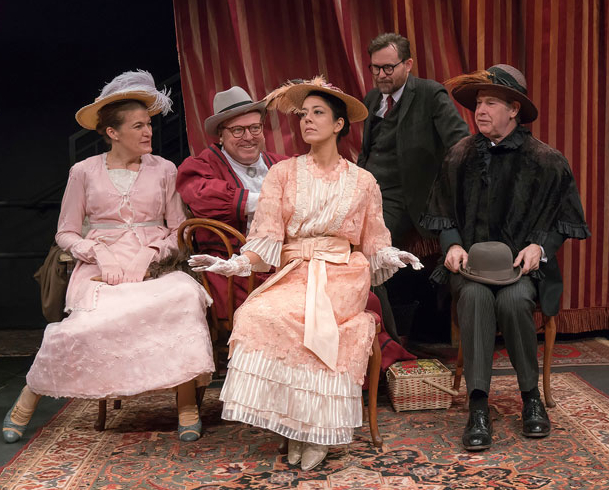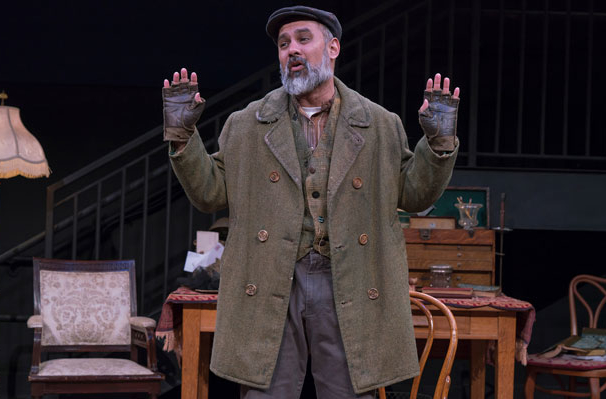Eliza Doolittle Speaks to the Immigrant Experience in a Revival of Pygmalion

(© Ashley Garrett)
"Accha aap ka beta hai?" barks an angry Eliza Doolittle in the opening scene of Pygmalion. That line, in Hindi, isn't found in George Bernard Shaw's original text, nor is the Indian accent with which Vaishnavi Sharma infuses the Cockney English of Eliza Doolittle. We learn soon enough that this Eliza comes from immigrant stock, so her struggle to find a better life in a society that looks down on her resonates loudly today. That's just one of the smart, relevant touches that director Eric Tucker has woven into his exceptionally performed, highly entertaining, must-see production of Shaw's classic.
A bold addition to the text like that is not unusual for Bedlam, a theater company accustomed to taking chances with innovative reimaginings of plays like Shakespeare's Hamlet and Shaw's Saint Joan. In those productions, actors doubled and tripled up on parts in imaginative ways, and audience members were positioned in close proximity to the action. The same happens in this Pygmalion (the title comes from the myth of a sculptor who falls in love with his creation, a statue of a woman that comes to life).
Upon entering the theater, the audience stands in what looks like a waiting area. But soon it becomes the bustling scene of London's Covent Garden on a rainy day in the early 1900s as the young, wealthy Freddy Eynsford-Hill (Edmund Lewis) enters and overturns the basket of flower girl Eliza Doolittle (Sharma), who upbraids Freddy's mother (Nigel Gore) in Hindi and heavily accented English for not raising a better-mannered son. This altercation is of great interest to the haughty phonetician Henry Higgins (Tucker), who brags to his colleague, Colonel Pickering (also Gore), that he could train Eliza and pass her off as a duchess in three months.

(© Ashley Garrett)
Audience members are then led into the main theater area, where they are seated around the study of Professor Higgins (effective set design by John McDermott). It's the next day, and Eliza unexpectedly arrives to take Higgins up on his boast and pay him for lessons to improve her English so that she can get a job in a flower shop. After initially balking at her suggestion, Higgins finds the idea of transforming a lowly flower girl into a "duchess" too delicious to turn down. So he puts Eliza through a daunting regimen of elocution and etiquette under the strict watch of his housekeeper, Mrs. Pearce (Annabel Capper). But in the process of spending so much time with Eliza, the confirmed bachelor Higgins begins to undergo a gradual transformation of his own.
Tucker directs this nearly flawless production with accomplished stagecraft and relentless humor, yet also with a poignant delicacy, as in a silent scene in which Eliza readies for the garden party (sensitively lit by Les Dickert). Sharma, who plays Eliza with pathos and delightful wryness, has us in the palm of her hands from the get-go, even as she stridently tells Higgins, "I'm a good girl, I am," again and again.
Tucker's impeccably performed Higgins is matched by the perfectly cast Capper, who gives Mrs. Pearce a severity tempered by tenderness, and by Gore, whose avuncular Pickering cozily complements the emotionally aloof Higgins. The production's comedic center, however, is Lewis as Higgins's mother. Entering in a sizable red dress (period-inspired costumes by Charlotte Palmer-Lane), Lewis need only open his eyes a bit wide and grimace slightly to have the audience in stitches. Together with Capper and Gore, he performs a hat bit that showcases Bedlam's talent for role swapping and good old-fashioned stage magic.
Equally compelling in this lively two-hour production (no intermission) are the social issues raised by Eliza's father, Alfred, played with no-nonsense pragmatism by Rajesh Bose. The play's concerns with the hypocrisies of (white) middle-class morality and with the near impossibility of overcoming prejudice in an inherently rigged economic class system are brought into relief even more by portraying Eliza and Alfred as nonwhite immigrants. As our country glibly decides which people should or should not be granted permission to transform themselves into Americans, the play suggests that perhaps our attitudes toward the worth and potential of others could do with a little transformation too.










